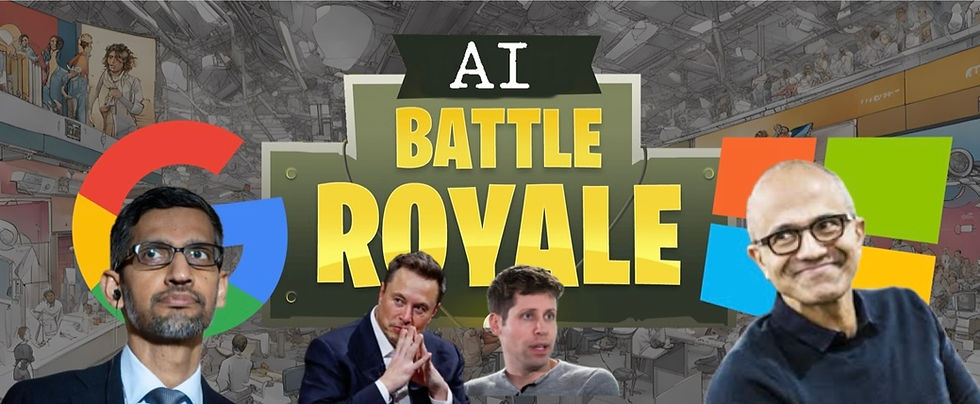From Internet Gold Rush to the AI Wars: Google’s SGE Gambit in a Transformative Landscape
- Rich Washburn
- Sep 12, 2023
- 3 min read

The annals of technology history are replete with game-changing innovations that send shockwaves through entire industries. There are periods, however, that are particularly interesting due to a sudden influx of groundbreaking changes, disrupting and redefining how we live and work. For those old enough to remember, the early days of the internet come to mind—a time when startups could become behemoths overnight and established giants either pivoted or perished. Fast forward to today, and we're at another inflection point, this time in the realm of artificial intelligence (AI). At the heart of this paradigm shift lies a fierce rivalry, one that could redefine how we interact with information: the 'AI Wars,' with Google's latest project, SGE, as its newest weapon.
The Early Internet: A Precedent of Paradigm Shifts
The early internet days can be likened to the Wild West. Anyone with a good idea and some coding skills could establish a startup and be the next Yahoo or Netscape. This was an era of hyper-growth and speculative valuations, but it was also the cradle of key innovations. E-commerce, social media, and the entire digital advertising landscape have their roots in this period.
The notable takeaway is that during these initial phases, companies were often less constrained by regulation and legacy systems. Experimentation was the order of the day, and it was a race to get to the market first and refine later. Giants like Google emerged during this time, and their core business models have largely remained intact for decades.
The AI Boom: New Kids on the Block
Contrast this with the current AI boom. Today, behemoths like Google, Microsoft, and Meta are so deeply entrenched that the barrier to entry is almost insurmountable for newcomers. However, the existential threat posed by innovations like ChatGPT to Google's core search business proves that no position is entirely unassailable. With 60% of its revenue coming from search advertising, Google finds itself at a critical juncture. Bing's partnership with OpenAI and its integration of ChatGPT indicates the opening salvos of a full-blown AI war, where leapfrogging is not just a possibility but a reality.
This modern landscape is a tug-of-war between large corporations with massive data sets and immense computational power. They are all vying for the same goal: seamlessly integrating AI into consumer's daily life, in search, e-commerce, and even creative endeavors. Google's lag in releasing public AI models is both a sign of caution and a potential Achilles heel, as researchers and talent have departed to form rival ventures.
Google's SGE: A Leap Toward the Future
In this context, Google's new SGE (Search Generative Experience) should be viewed as an attempt not just to catch up but to potentially leapfrog over Microsoft and others. With DeepMind's prowess in games and strategy and Bard's expertise in conversational AI, SGE represents an amalgamation of multiple competencies. The underlying model, RT2, powers a multimodal understanding that can process images and text. SGE is not just a query-response machine but a mentor, tutor, and creative assistant.
The stakes are high, as SGE's integration directly into Google Chrome could redefine our online experiences. Its potential in adapting to individual learning styles, planning, and time management could be game-changing, especially when mental health and well-being are factored in.
Final Thoughts: Caution and Ethical Considerations
However, as history has shown, each technological revolution comes with its own set of ethical and societal challenges. Whether it's the misinformation prevalent in the early days of the internet or the looming concerns of AI-generated bias, both eras require cautious optimism.
Google's SGE offers a personalized, multi-modal experience, but it also poses risks, like the potential for misinformation or over-reliance on AI for tasks best left to human expertise. The AI wars are just starting to heat up, and the landscape will likely look radically different in just a few years, shaped by breakthroughs, regulations, and potentially, corporate blunders.
While we can't predict the future, one thing is certain: we're at a technological tipping point, reminiscent of the early internet days, but vastly more complicated due to the deep entanglements of AI in our social fabric. How we navigate this landscape will define the next chapter of our digital lives. With SGE, Google has thrown down the gauntlet; let the AI Wars begin.

Comments